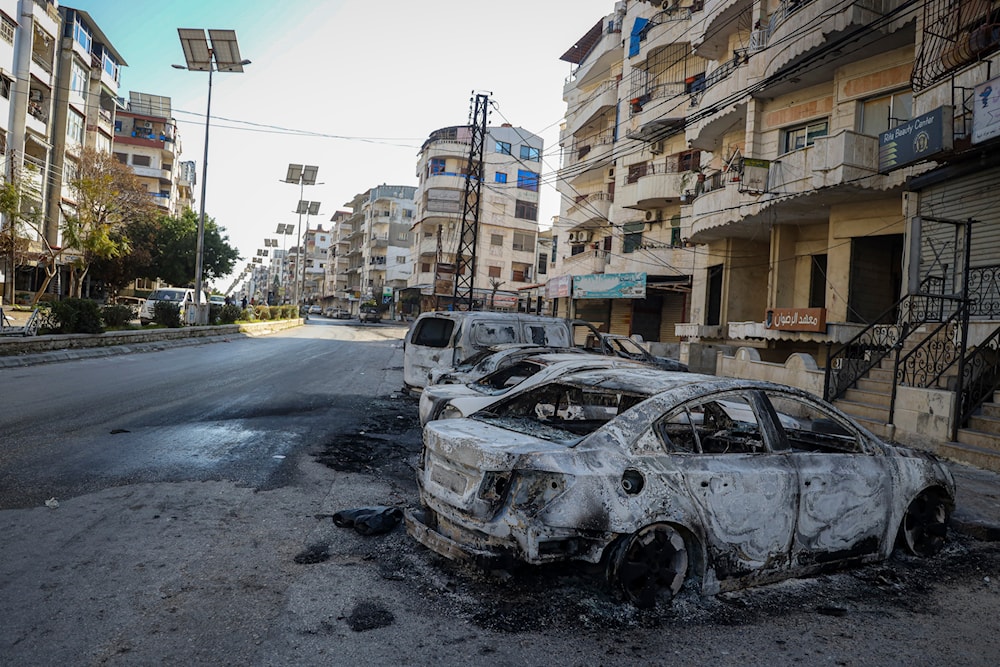SOHR says massacres in Syrian coast 'systematic genocide'
The Syrian Observatory for Human Rights' announcement comes after it obtained four videos showing field summary executions of unarmed Alawite men.
-

Burnt cars remain in the middle of a street following the recent wave of sectarian attacks by the Syrian security forces, Jableh, Syria's coastal region, Monday, March 10, 2025 (AP)
The Syrian Observatory for Human Rights announced that it obtained several videos documenting field executions of unarmed Alawite youth in the Latakia outskirts.
SOHR stated on Sunday that the four videos obtained support previous reports that said the massacres in the Syrian coast were "systematic and aiming toward genocide," contrary to what officials of the current Syrian regime have described as "individual transgressions."
In the footage revealed by the "Syrian Observatory," the first video shows two young men kneeling on the ground as security forces hurl insults and brutally beat them, despite their repeated pleas that they "had done nothing wrong," while the second video captures the torture of four civilians, including two elderly men, and the forced humiliation of one victim made to kiss the boot of a security officer.
The third video captures the brutal whipping of civilians before their execution, while the fourth shows the bodies of eight victims alongside a young man standing, awaiting his imminent execution. This brings the total number of victims in the fourth video to nine, all of whom are Alawites.
The Syrian Observatory called on the transitional phase President, Ahmed al-Sharaa, to conduct "urgent and public trials" for those involved, whose faces were visible in the footage, while also rejecting the referral of the case to the government-formed "Fact-Finding Committee" established by al-Sharaa, as some of its members had previously justified violations against Kurdish civilians in Afrin, with one committee member even denying the occurrence of mass killings in a televised statement.
SOHR warned that "neglecting the prosecutions of the perpetrators [of the massacres] will encourage more crimes and massacres", asserting that systematic sectarian violence threatens national security, especially in the areas where Alawites form a majority.
Syria on path to fragmentation, al-Sharaa has limited time to act: FT
The violence that erupted in Syria’s coastal cities is a troubling indication of the country’s potential fragmentation along sectarian lines, suggested John Sawers, the former head of the UK’s foreign intelligence service (MI6), in an opinion piece published in the Financial Times.
Sawers stressed that sectarian violence serves as a "wake-up call" for Syria’s interim president, Ahmad al-Sharaa, adding that his promise to form an inclusive government "has so far proved largely empty."
He further asserted that al-Sharaa had self-appointed himself to power, noting that he focused on consolidating authority for himself and the narrow bloc he led during last month’s National Dialogue conference in Damascus, which was attended by "other opposition groups."
The report recounted that Hay'at Tahrir al-Sham (HTS), led by al-Sharaa, emerged from al-Qaeda’s Syrian branch, highlighting that the interim president and his armed followers "are still rooted in a brand of Salafist Islamism that is unpopular even within the majority Sunni community."
Sawers pointed out that al-Sharaa appointed his HTS aides to senior positions in the new military after dissolving the former Syrian Arab Army and police force, arguing that he had repeated: "the painful mistakes the Americans made in Iraq after the fall of Saddam Hussein’s regime."
The former MI6 chief emphasized the need for al-Sharaa to act swiftly to demonstrate his commitment to building an inclusive Syria, warning that "trying to re-establish autocratic power in such a diverse country is a recipe for violent resistance."
Violence in Syria 'reaches a conclusion'
Violence across Latakia and surrounding areas spread following clashes between government security forces and fighters allegedly affiliated with the former regime of Bashar al-Assad, a war monitor reported on March 7.
The Syrian Ministry of Defense announced that the "military operation" on the coastal line had been concluded on March 10, claiming that it eradicated the former regime's cells and members across Tartus and Latakia, noting that an alleged investigation was underway to look into the recent events and ensure justice for the victims.
Local sources reported that tensions in the Syrian coastal region have started to ease as a UN mission commenced its tour from the city of Jableh, noting that "a state of cautious calm prevails in several areas of Latakia's countryside, particularly with the withdrawal of foreign fighters from these areas."
A local source confirmed to Al Mayadeen that a United Nations delegation entered the city of Jableh in the Latakia countryside, Syria, for the first time on March 10, accompanied by members of the new regime's General Security as they toured the neighborhoods, inspecting shops and homes that were recently looted and burned.
Syria’s transitional leader, Ahmad al-Sharaa, pledged on Sunday to hold accountable those responsible for the violent clashes between militants allegedly linked to ousted President Bashar al-Assad and the country’s new security forces, stressing that anyone exceeding their authority will face consequences.
The attacks in northwestern Syria have displaced thousands belonging to the Alawite minority group, many of whom told The New York Times of harrowing accounts of their experience as armed forces reached their villages.

 5 Min Read
5 Min Read








